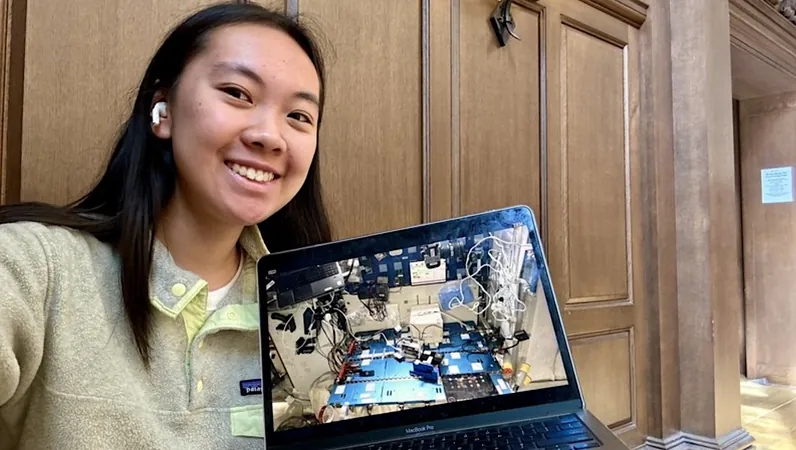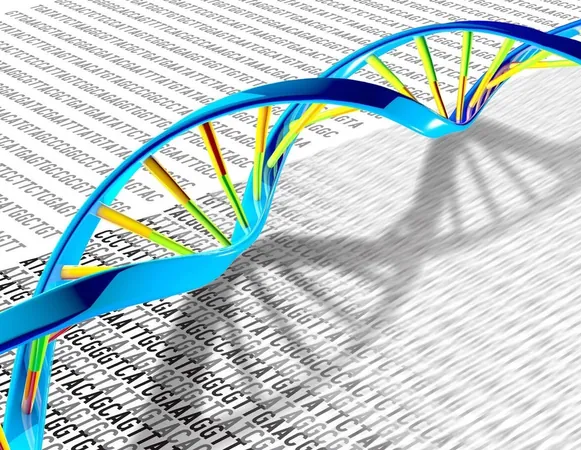
Groundbreaking Experiment by Young Scientist Launched to the International Space Station!
2024-11-18
Author: Ming
Groundbreaking Experiment by Young Scientist Launched to the International Space Station!
On September 28th, a remarkable experiment concocted by 18-year-old winner of the Genes in Space 2023 contest, Jiang from Hillsborough, California, was launched aboard NASA’s Crew-9 mission to the International Space Station (ISS). Just four days later, her ambitious investigation was initiated by American astronaut Don Pettit, marking a significant milestone for both the young scientist and space research, with a second run scheduled for later this month.
Jiang’s Research Objectives
Jiang’s research seeks to validate an innovative method to explore the impact of space conditions on retrotransposons—mysterious mobile genetic elements that can reposition themselves throughout our genome. Notably, LINE-1 copies make up nearly 17% of human DNA; typically, their mobility is kept at bay by the body’s natural defenses. However, Jiang hypothesizes that the unique environment of space—heightened radiation and oxidative stress—might trigger these rogue elements, potentially increasing genetic risks for astronauts.
Research Methodology
To delve deeper, Jiang's project employs a cutting-edge technique called nucleic acid sequence-based amplification (NASBA), along with a fluorescent molecular beacon, to quickly detect LINE-1 RNA. This RNA detection is crucial as it serves as a warning sign for the retrotransposon activity across the genome. Utilizing two specialized instruments aboard the ISS, the Genes in Space Fluorescence Viewer and the miniPCR thermal cycler, Jiang aims to carry out her research with unprecedented efficiency.
Jiang's Experience
Jiang expressed her excitement and disbelief as she watched astronaut Don Pettit execute her experiment via livestream while balancing her classes at Yale University, where she is majoring in Molecular, Cellular, and Developmental Biology. "Witnessing Don Pettit performing an experiment that I meticulously designed was surreal," she gushed. "The sight of the miniPCR equipment on the ISS reminded me of similar tools I’ve used here on Earth. This is a dream come true!"
Legacy of the Genes in Space Initiative
Her achievement is not merely a personal victory—it builds upon the legacy of previous high school students who have made strides through the Genes in Space initiative, which has pioneered various genetic discoveries in the void of space.
Importance of the Initiative
With its establishment in 2015 by miniPCR bio and Boeing, alongside backing from the ISS National Laboratory® and New England Biolabs, the Genes in Space program serves as a vital platform for young innovators like Jiang. The insights garnered from her study aim to equip scientists with a better understanding of the potential genetic hazards astronauts may face on long-term missions to destinations like Mars.
Looking to the Future
As humanity looks towards the stars, experiments like Jiang's not only illuminate the mysteries of our very DNA but pave the way for safer and more sustainable space explorations. What will her findings reveal about the genetic risks of space travel? Stay tuned—you won’t want to miss the groundbreaking results!

 Brasil (PT)
Brasil (PT)
 Canada (EN)
Canada (EN)
 Chile (ES)
Chile (ES)
 España (ES)
España (ES)
 France (FR)
France (FR)
 Hong Kong (EN)
Hong Kong (EN)
 Italia (IT)
Italia (IT)
 日本 (JA)
日本 (JA)
 Magyarország (HU)
Magyarország (HU)
 Norge (NO)
Norge (NO)
 Polska (PL)
Polska (PL)
 Schweiz (DE)
Schweiz (DE)
 Singapore (EN)
Singapore (EN)
 Sverige (SV)
Sverige (SV)
 Suomi (FI)
Suomi (FI)
 Türkiye (TR)
Türkiye (TR)